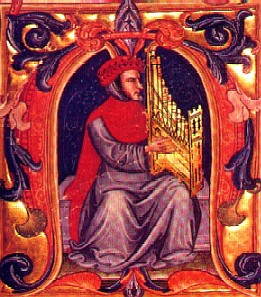
Francesco Landini
Francesco Landini (c. 1325 or 1335 – 2 September 1397; also known by many names) was an Italian composer, poet, organist, singer and instrument maker who was a central figure of the Trecento style in late Medieval music. One of the most revered composers of the second half of the 14th century, he was by far the most famous composer in Italy.
This article is about the Italian Trecento composer sometimes known as Magister Franciscus. For the French ars nova composer, see Magister Franciscus.Name[edit]
Francesco's name is recorded in many variants throughout medieval manuscripts and documents, including, Francesco degli Organi, Francesco il Cieco, Francesco da Firenze, Magister Franciscus de Florentia, Magister Franciscus Coecus Horghanista de Florentia, Francesco degli orghani and Cechus de Florentia.
Modern scholars no longer accept the idea that Francesco was a member of the Landini family and prefer to use the names "Francesco degli Organi" or "Francesco degliorghani" (Francesco of the organs), "Francesco da Firenze'"(Francesco of Firenze), and "Francesco il Cieco" or "Franciscus cecus" (Francesco the blind) to refer to the composer. The surname "Landini" or "Landino" has not been linked to the composer in any sources of the 14th century nor in secondary references in the 15th century. The evidence linking Francesco to the Landini family via his presumed father, who was identified by Filippo Villani as a painter who lived a simple life is no longer accepted by art historians. It can therefore also no longer be maintained that the painter Jacopo del Casentino (formerly also referred to as "Jacopo Landino") was his father or that Cristoforo Landino was his great-nephew. It was Cristoforo's naming of Francesco as an ancestor when he connected himself to an ancestor "Lando di Nato," taking on the family name of "Landini" that has caused centuries of scholars to call the composer Francesco Landini or Landino.[1]
Context and sources[edit]
Details of Francesco's life are sketchy and few facts can be established with certainty, but the general outline has begun to take shape as more research has been done, especially into Florentine records. Most of the original biographical data on him comes from a 1385 book on famous Florentine citizens by chronicler Filippo Villani, who was also born approximately 1325.
Legacy[edit]
Numerous contemporary writers attest to his fame, not only as a composer, but as a singer, poet, organist, philosopher, and passionately devoted citizen of Florence, notably Giovanni da Prato, in his book Paradiso degli Alberti. This book, written in 1389 contains short stories, one of which supposedly was related by Landini himself. His reputation for moving an audience with his music was so powerful that writers noted "the sweetness of his melodies was such that hearts burst from their bosoms."[3]
Landini is the eponym of the Landini cadence (or Landino sixth), a cadential formula whereby the sixth degree of the scale (the submediant) is inserted between the leading note and its resolution on the tonic. However this cadence neither originated with him, nor is it unique to his music; it can be found in much polyphonic music of the period, and well into the 15th century (for example in the songs of Gilles Binchois). Gherardello da Firenze is the earliest composer to use the cadence whose works have survived. Yet Landini used the formula consistently throughout his music, so the eponym—which dates from after the medieval era—is appropriate.